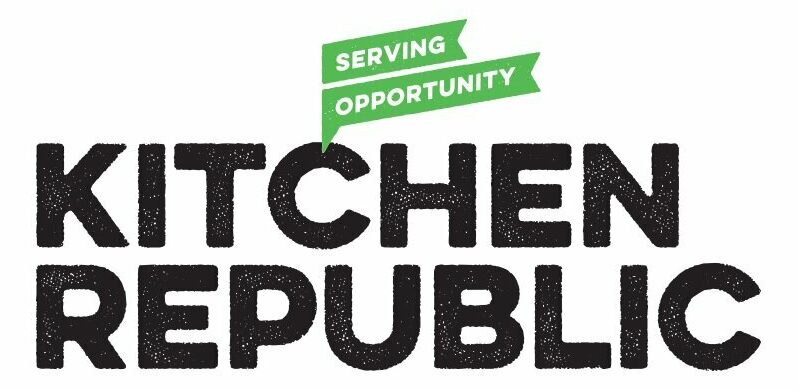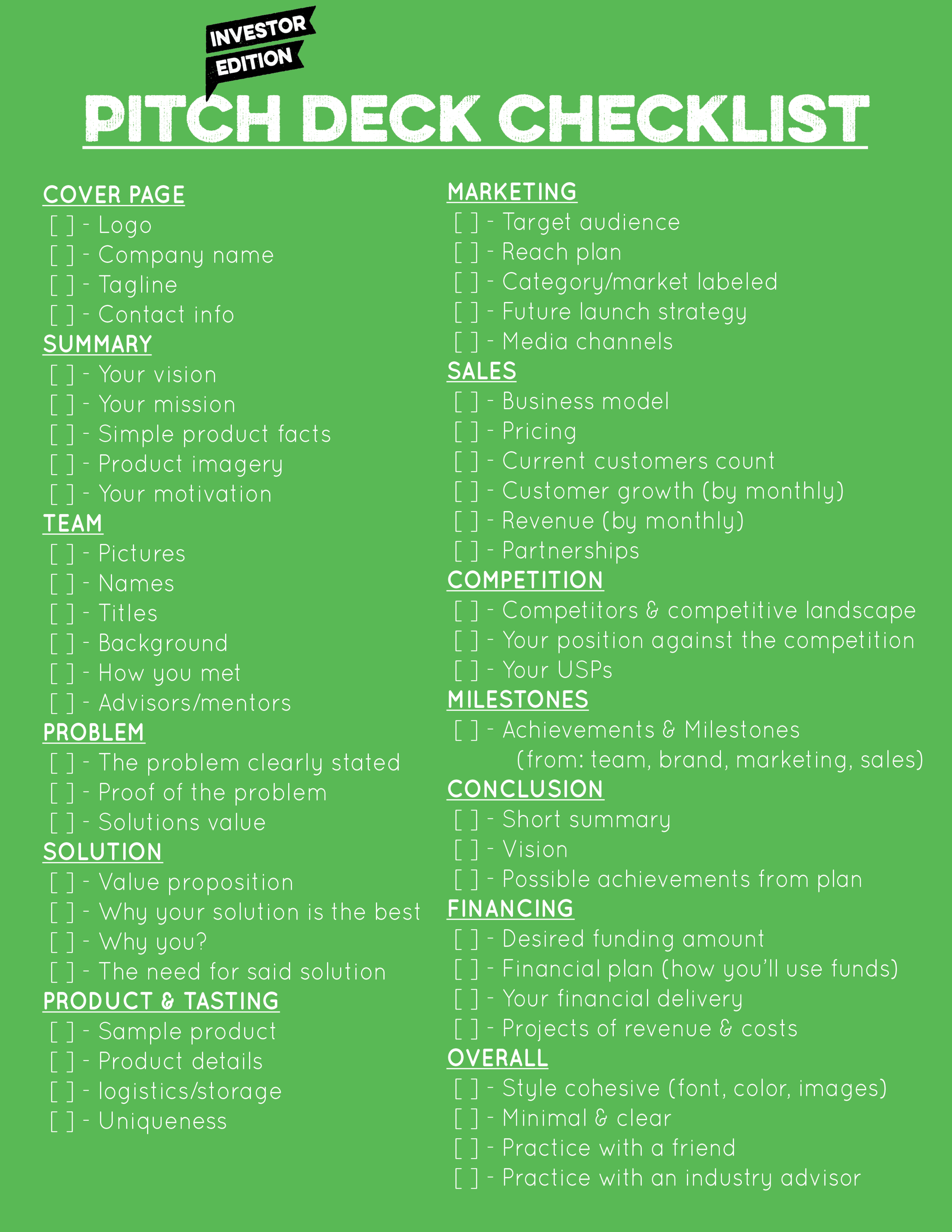Hoe je het went of keert, iedere ondernemer heeft ooit een pitch deck nodig. Een pitch deck, ook wel bekend als sales/trade presentatie, is eigenlijk een soort superhelden cape. Zoals Superman nooit zonder cape van een gebouw vliegt, zo zit jij als ondernemer nooit met een potentiële investeerder of retailer om tafel zonder pitch deck. Zoals je van ons gewend bent, laten we graag experts aan het woord om deze vraag te kraken. Om die reden zitten we aan tafel met ervaringsdeskundige Danielle Mol van GreenUp Consulting die ons de ins en outs van pitch decks wil vertellen.
Danielle Mol heeft meer dan 12 jaar ervaring in de foodsector en is in haar leven vaak verantwoordelijk geweest voor miljoenen contracten. Ze is jong succesvol geworden in haar werk, maar na een mooie reis kwam ze dichterbij haar missie dan ooit: plantaardig eten de standaard maken. Zo werd haar consultancy bedrijf GreenUp geboren. Middels haar bedrijf helpt ze plantaardige bedrijven met categorie analyses, schap advies, trend en consumenten presentatie, maar ook met het voorbereiden van gesprekken met grote retailers. Daarnaast helpt ze ook bedrijven die graag de transitie naar een meer plantaardig assortiment willen maken.
Wat is een pitch deck?
Een pitch deck of sales/trade presentatie is bedoeld voor het binnenhalen van investeerders of listings bij grote retailers. De basis is een overzicht van je business plan, je producten, services en verwachte groei.
Dat lijkt makkelijk, maar helaas. Eenmalig een presentatie maken en nooit meer aanpassen, dat wordt het helaas niet. Tuurlijk, een goede basis hebben scheelt veel tijd, maar het is erg van belang dat de presentatie wordt aangepast op met wie je het gesprek zal hebben.
Elke retailer en investeerder is anders, ze hebben andere doelen en visies. Daarom is het extreem belangrijk dat jij je huiswerk doet. Doe research en ga, als het mogelijk is, op bezoek bij de fysieke winkels. Dit is een goede manier om in het hoofd van de potentiële investeerder or retailer te kruipen.
*De rest van dit artikel zal focussen op retailers, maar kijk voor wat meer informatie over investeerders onderaan rechts.
Orde op zaken stellen: het formuleren van doelen
Los van het pitch deck is het cruciaal om heldere en duidelijke doelen voor jezelf en jouw bedrijf te hebben. Het helpt je namelijk op veel manieren. Met duidelijke doelen in je achterhoofd is het maken van een pitch deck veel makkelijker. De volgende vraag die je jezelf gaat stellen is namelijk, “wat wil de persoon tegenover mij en hoe kan ik helpen om dit doel te bereiken”.
Duik in het hoofd van de inkoper
Elke retailer is anders en daarnaast zien zij dagelijks veel pitches voorbij komen. Daarom is het essentieel dat je opvalt. Wil jij een deal maken? Dan is jouw taak om hun oplossing te zijn! Wie weet ben jij de oplossing waarvan ze niet wisten dat ze het nodig hadden.. Om jouw gesprekspartner te leren kennen en snappen, is het goed om je de volgende vragen te stellen:
-
Met wie heb ik een gesprek?
-
Wat is belangrijk voor diegene?
Hint: Maak alles zo makkelijk mogelijk voor ze! Creëer simpele en uitvoerbare oplossingen. Hoe minder logistieke vragen zij hoeven te stellen, hoe beter.
-
Wat is de toegevoegde waarde van mijn product(en) voor de retailer EN de klanten?
-
Wat zijn mijn USP’s (Unique Selling Points)?
-
Draag ik bij aan het behalen van de targets?
-
Zijn er drempels met betrekking tot mijn product en hoe kan ik deze wegnemen?
Bezoek de winkels of doe research naar vergelijkbare producten op het schap.
Vraag het personeel hoe de verkoop van jouw concurrenten gaat en wat ze van jouw product vinden.
Een voorbeeld graag?
Inzicht in wie je gesprekspartner is, is zeer belangrijk om er een succesvol gesprek van te maken. Elke situatie is anders en uniek en vraagt daarom om een aangepaste presentatie voor degene tegenover je.
Het hebben van een checklist kan je helpen om te onthouden welke onderdelen in je pitch deck moeten zitten. Danielle heeft een uitgebreide checklist voor haar klanten, meer informatie daarover en haar contactgegevens vind je hier.
Pssst: Je kan ook even spieken bij de voorbeeld checklist voor het investor pitch deck onderaan de blog.
De basis
Er is een vuistregel dit zegt: houd je informatie minimaal, helder en uniform. Op die manier kom je over als een professional en zal je geen deal mislopen, omdat de retailer je niet heeft begrepen. “Naar mijn mening is er geen standaard lengte van pitch decks. De lengte van je deck hangt ook af van of je het fysiek of online bespreekt, of je een geschiedenis hebt met de retailer. Deze onderdelen spelen allemaal een rol in het bepalen van de lengte.” Geen paniek, er is een algemene consensus over wat er sowieso niet kan missen in je deck.
Dat zijn onderwerpen zoals
-
Storytelling van jouw merk, waaronder ook jouw team en eventuele adviseurs. Hierdoor ziet de retailer dat je samenwerkt met relevante expertises en dat geeft vertrouwen.
-
Ontwikkelingen in jouw food/drink category, maar ook trends en ontwikkelingen in de industrie.
-
Jouw onderscheidend vermogen en USP’s
-
Productvoorstel (verwachtingen en pretatie)
-
Support plan
-
Positionering en schap advies
-
Logistieke data (de houdbaarheid, order quantity, pricing, etc)
-
En de grote vraag: “what’s in it for them?”
Bij twijfel, vraag het!
Veel ondernemers hadden zichzelf moeilijkheden kunnen besparen als ze er simpelweg iets van hadden gezegd. De conclusie die we daaruit kunnen trekken is, dingen vragen is en blijft belangrijk. Voor en tijdens het maken van je pitch deck is het dus goed om de antwoorden op belangrijke vragen te krijgen. Vraag bijvoorbeeld aan een retailer of er beperkingen zijn omtrent houdbaarheid of dat zij focus hebben op bepaalde messaging (een duurzaam verhaal bijvoorbeeld). Het lijkt simpel, maar niet iedereen denkt eraan.
Samen sta je sterk
“Het draait echt om samenwerking als je besluit om jouw producten te gaan leveren aan een retailer en de verbinding aan te gaan”, zegt Danielle. Als je jezelf presenteert aan een retailer, is het belangrijk dat je onthoudt dat de samenwerking van twee kanten komt. Met dit uitgangspunt zul je altijd de neuzen dezelfde kant op hebben. Zo kom je niet alleen sneller tot een deal, maar is het ook gemakkelijker om op het schap te blijven.
“Sprekende vanuit mijn ervaring, kan ik echt zeggen dat het een voordeel is om je gesprekspartner zich gehoord te laten voelen. Hierdoor is deze persoon sneller geneigd om positief resultaat te boeken.”
Begin met de kleine vissen
Wil je op het schap van de grootste supermarkt van Nederland? Gaaf! Maar onderschat niet de waarde en voordelen van beginnen bij een kleinere vis in de zee. Starten bij een kleine retailer geeft je de kans om te oefenen met het vertellen van je verhaal en het finetunen van je business voordat de meetings met grote vissen langskomen.
Weten waar je het over hebt is in ieder geval zeer belangrijk om een retailer deal te sluiten. Je bent zo goed als je data. Natuurlijk is het noodzakelijk om jouw pricing en volume informatie te delen, daarnaast is data over de industrie ook een goede toevoeging. Gebruik hiervoor natuurlijk wel alleen betrouwbare bronnen.
Behulpzame industrie databronnen:
KR Sidebar:
Let’s talk investors
Deze blog is toegespitst op retailer pitches, maar er is veel overlap met het pitchen voor investeerders. Nog steeds staat het probleem, de oplossing en alles wat je in deze blog hebt geleerd centraal. Dit artikel van Forbes geeft wat meer informatie over pitchen aan investeerders.
https://www.forbes.com/sites/alejandrocremades/2018/03/02/how-to-create-a-pitch-deck/
Bekijk ook onze Investor Pitch Deck checklist:
-
Distrifood – de eerste maand is gratis. Je vindt er veel artikelen over sales data, wat een goed startpunt kan zijn. Retailers maken er ook gebruik van!
-
CBS or CBP – een overheidsbedrijf met een grote hoeveel consumenten data welke makkelijk bereikbaar is.
-
Nielsen/IRI – een goede plek om uit te vinden hoe jouw categorie zich aan het ontwikkelen is wanneer je data wil aanschaffen.
-
Proveg – zeer behulpzaam voor vegan gratis data.
-
Winkelbezoeken – het kan nooit kwaad binnen te stappen en direct te vragen.
Practice makes perfect
Het is een bekend advies, maar oefen zoveel je kunt! Zorg dat je alles weet voordat je een meeting instapt. Van de informatie over jouw categorie, tot je logistieke benodigdheden, laat niks liggen. We kunnen je ook adviseren om je pitch te oefenen op kennissen, maar beter nog op iemand uit de industrie zelf. Zij kunnen je dat beetje perspectief bieden waar je zelf nog niet bent opgekomen.
Laatste advies
Je weet nooit honderd procent waar je concurrent mee bezig is en soms zegt een retailer heel enthousiast te zijn over je product, het is pas een deal wanneer er getekend is. Het is moeilijk, het is competitief, maar ambitie en volhardendheid betalen zich altijd uit.
Twijfel je over of je het alleen aan kan? Neem dan iemand aan, zodat je dit samen professioneel aan kan vliegen.
Op 1 juni gaf Danielle een workshop voor de KR Academy over dit onderwerp. Daarnaast biedt ze een 3 maanden coaching programma aan om producenten zoals jou te helpen met het bouwen aan de fundamentele zaken als het gaat om retail strategie. Stuur haar vooral een berichtje via Linkedin of kijk op haar website.



